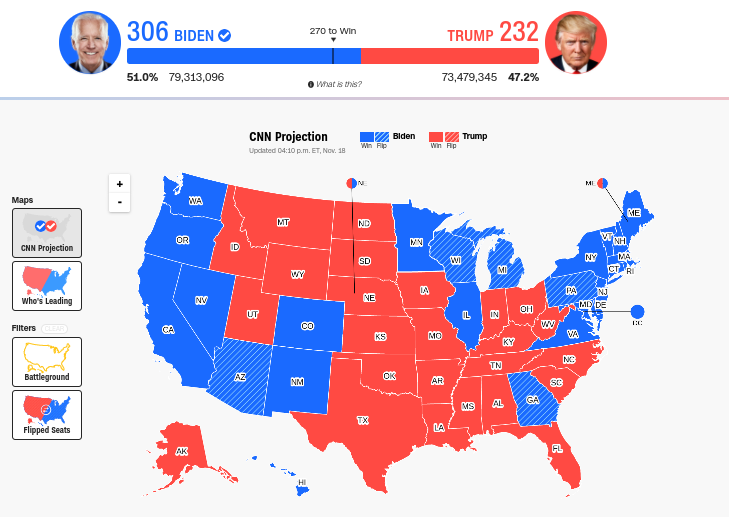Aftermath: The Legacy of the 2020 Election
The United States held its 46th presidential election last fall — it took place from November 3rd to November 7th. Late afternoon on November 7th, former Vice President Joseph R. Biden, Jr. was projected to win the presidency with 306 electoral votes to Donald Trump’s 232.
Mr. Biden flipped many key states that contributed to his victory including Wisconsin, Michigan, and Pennsylvania, three states Mr. Trump had previously won during the 2016 election.
Overall, Mr. Biden won by 74 electoral votes and almost 6 million individual votes. This not only resulted in him winning the election, it also represents a symbol for Democrats, as it was a wider margin of victory than Mr. Trump’s over Ms. Clinton in 2016.
Now, four months later, the controversial election still has a great impact on society. During and after the election, President Trump made claims that voter fraud and other similar events had taken place. Some of these claims included: late votes being counted, missing ballots, and “software glitches,” among others. None of which have been backed up with evidence or lead to fruitful investigations.
Along with these claims, President Trump sued multiple state and federal courts namely in Pennsylvania, Nevada, Georgia, and Michigan. However, many of these cases were not viewed to have had merit by the judges and were subsequently thrown out. Furthermore, experts said that President Trump’s cases would not have meaningfully affected the election.
“There’s literally nothing that I’ve seen yet with the meaningful potential to affect the final result,” says Justin Levitt, a law professor at Loyola Law School.
After the results of Wisconsin, President Trump was also quick to call for a recount, as he did with Georgia.
Shortly after his suits were thrown out, President Trump took to Twitter in an effort to keep the office, but ended up getting most of his tweets deleted for misinformation and eventually had his account suspended.
During all of this, Mr. Biden had been preparing for his time in office along with Ms. Harris. Even during the election, they had been receiving briefings on current events, and had started thinking about filling critical positions across the agencies, striving to fit Mr. Biden’s plan for creating “the most diverse cabinet in history.” They also prepared for the transition into the White House, raising money and working with members of the Trump administration who had been “working in good faith.”
However, threats of not conceding were made public by those unhappy with the results and the Trump administration itself. Among them was Senator Mitch McConnell, who initially made claims stating that President Trump was “100 percent within his rights to look into allegations of irregularities and weigh his legal options.” (Note: Mr. McConnell ultimately capitulated, throwing his weight behind the lawful transition of power.)
President Trump used his remaining time in office to put through some executive orders that he believes were necessary to do before the end of his presidency. These included announcing the removal of troops from Afghanistan, Iraq, and Somalia, and nominating individuals for key administration posts.
And then, of course, the events of January 6th.
In short, the United States 2020 presidential election brought with it an abundance of controversy and chaos, and paved an uncertain future for the United States.













